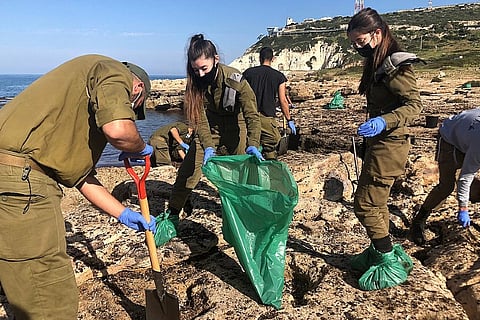

What does the continuing, low-intensity conflict between Israel and Iran have to do with the mysterious oil spill that has washed ashore along the coast of Israel and southern Lebanon in recent weeks, leaving a costly ecological disaster?
Nothing at all was the first assumption. But as more information comes to light, the two may be intimately linked.
The first sign that Iran and Israel were involved in an asymmetric naval conflict came with reports of an attack against an Israeli-owned merchant vessel in the Gulf of Oman in late February. That's obviously a long way from the Mediterranean.
But then two weeks later, an Iranian state-run shipping company reported an attack on one of its vessels in the eastern Mediterranean off the Syrian coast. Speculation soon followed that this could have been Israel's response to the earlier attack on its commercial vessel – only for it then to emerge in a Wall Street Journal report last week that the attack was apparently part of an Israeli campaign against Iranian cargo vessels and oil tankers over the last 18 months that has reportedly targeted a dozen vessels.
So could the oil spill have actually been an unexpected consequence of Israel's own clandestine campaign against Iran, as some media outlets have already speculated? In the wake of the Wall Street Journal report, Israel's defence minister on Sunday denied that Israel bore any responsibility for the damage along the coast.
But the tit-for-tat claims have been growing. Israel's environment minister had already pointed the finger at Iran, accusing it of "environmental terrorism", although this claim didn't find much support among the Israeli security establishment.
The speculation won't stop until the source of the spill is identified – and that seems to be proving difficult. A Greek vessel was cleared as a possible culprit after an investigation.
And attention will continue to focus on the environmental costs of maritime skirmishes. It seems likely in retrospect that an October 2019 missile attack against an Iranian vessel in the Red Sea that caused a small oil spill was part of the Israeli campaign.
There is plenty of publicly available data for tracking ship movements, and of course governments have access to lots more information through intelligence collection. It should be possible to determine the source of the spill, but getting to the bottom of exactly what caused one of Israel's biggest ecological disasters is proving a difficult task. Until the responsible party is identified, the role that the Iranian-Israeli maritime competition may have played in the disaster will remain a question.
